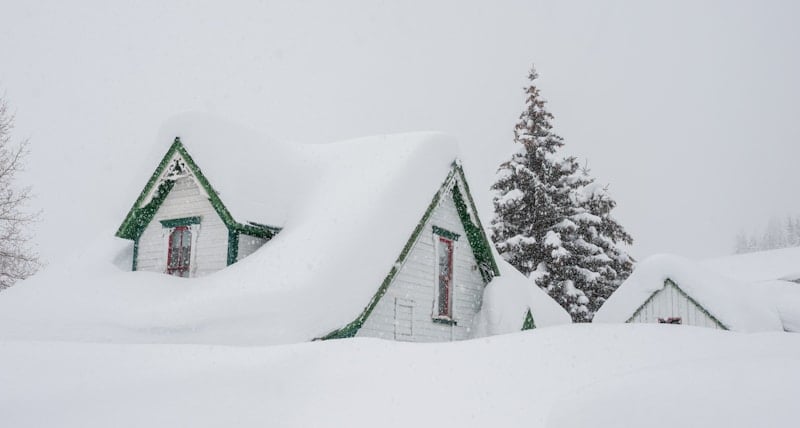Have you ever heard someone use a phrase that you didn’t know what it meant? It seems like English is full of such phrases today. Since you don’t want to look uneducated when you hear a phrase like “snowed under,” it’s important to take some time to understand what it means.
When someone tells you they’re “snowed under” what they’re really trying to tell you is that they’re swamped (or buried) with work. In other words, the person has a lot of work that they need to do. This is a phrase that people have been using since they were “snowed under” by the blizzard of 1880.
Meaning of This Idiom
When you think of “snowed under” in a literal sense you probably think of someone who’s covered or buried in the snow. However, this isn’t what this idiom means. Instead, it actually means to overwhelm you because you have too much of something. For instance, you may have so much work that you’re struggling to deal with it all.
This idiom also has some lesser-known meanings as well. One of which is slang for being under the influence of narcotic drugs. Others include:
- To affect or impress excessively
- To overcome, master, or subdue by superior force
- To overcome or overwhelm in feeling
- To furnish or equip with excessive power
- To gain mastery over the bodily powers or mental faculties of
There are a lot of different words and phrases that you can use instead of saying that someone has been “snowed under.” These include
- active
- busy
- hopping
- immersed in something
- inundate
- knee-deep
- load down
- overcome
- overwhelm
- run off your feet
- rushed
What this idiom doesn’t mean is that the load has been lightened or stripped away from a person.

Origin of This Idiom
Some people believe that this idiom was first used in 1880 in Stockholm, Sweden. The area was covered in a foot of snow throughout the course of a single night. An American journalist that was reporting about the recent blizzard said that the only thing that could be seen as the color white and so “The city was snowed under.”
Eventually, the term came to mean that a person was overwhelmed by paperwork. This is because papers are typically the color white and because the pile is similar to snow on a roof.
Another Snow-Related Term
The word “blizzard” is another snow-related term that was around for many years before it had anything to do with snow. Originally this word meant a “sharp blow” or a “gunshot.” However, in 1870 an Ohio journalist described a bad snowstorm as a “blizzard.” From that point on the word took on a whole new meaning.
Why We Use Idioms
Idioms can be defined as phrases or expressions that typically have a figurative meaning. As such, when this formulaic language is used its figurative meaning is different from its literal meaning. These can be found in almost every writing style except for technical writing. There are many reasons why writers have chosen to use idioms today.
Spice up Your Writing
Idioms do a great job of adding dynamism and character to an otherwise stale piece of writing. They’re also a great way of expressing a complex idea in a simple way, especially when you’re looking for a succinct (easy to understand) way of expressing an idea that’s either large or abstract in nature.
Encourage Creativity
When people use idioms they’re encouraging others to “think outside the box” or use their creativity. In this way, idioms are used as artistic expressions that will liven up the text. For instance, instead of saying that you’re buried with work, you could tell someone that you’re “snowed under” with work and thus paint more of an image in their mind.
Encourage Our Sense of Humor
Idioms are a great way of adding humor to your writing. For instance, you may not want to call someone “stupid” but you may want to say that they’re not “playing with a full deck.” This is a less insulting, somewhat humorous way of saying the same thing.
Improve Your Writing
There are a lot of different idioms that you can use to make your dull writing more impressive. When these idioms are used in the proper context they’ll make you sound better. For instance, it sounds better to say “add insult to injury” than to simply tell someone that their mockery is making the situation much worse.

Popular Idioms About Weather
“Snowed under” isn’t the only idiom in existence today. Some people believe that there are more than 25,000 idioms used in the English language. Which of these idioms you actually hear will depend on your age, culture, and social-economic group.
Weather is a popular topic in conversation today because it’s a neutral topic. This makes it the perfect topic to talk about with someone with whom you don’t wish to have a serious or meaningful conversation. However, when you’re talking about wheather you could be having more than a simple conversation with someone. In fact, there are at least 50 idioms about the weather in the English language today. Some of these include:
- “Storm in a teacup” refers to a small problem or event that’s been blown out of proportion. There are many variations to this idiom including “tempest in a teapot” (typically found in American English) or “tempest in a ladle” (a famous saying coined by the Roman statesman Ciero).
- “Raining cats and dogs” is a popular British phrase. Originating in the 17th century this idiom is used to describe the weather whenever it’s raining really hard. Nobody is quite certain how this idiom first originated though.
- “Lightning never strikes the same place twice” is an idiom that people will frequently use when trying to assure someone that the unfortunate circumstances they’ve endured won’t happen again. Unfortunately, you really can’t take this idiom literally because there have been several instances where it’s been recorded that lightning has indeed struck the same location on multiple occasions. For instance, the Empire State Building in New York City is known to get struck by lightning at least 23 times a year.
- “The calm before the storm” is an idiom that refers to the unnatural stillness that occurs before a storm occurs. People will typically use this phrase to describe the calm period that typically occurs before a crisis happens.
- “Face like thunder” is a saying that we don’t hear a lot of. When it’s used it means that a person looks very angry. For instance, you could say, “He entered the room with a face like thunder” meaning that “He entered the room with a very angry look on his face.”
- “To catch lightning in a bottle” is a phrase that dates back to Benjamin Franklin and his kite experience. Here he attempted to harness electricity from lightning to store in a bottle. Later this phrase was popularized in the context of baseball. Now it’s frequently used when describing someone who was successful after attempting a challenging feat.
How to Use This Idiom
There are two important things you should think about whenever you’re considering using the idiom “snowed under:”
- It is a transitive verb. This means that it’ll only make sense if an object (something that receives the verb’s direct action) is present.
- You should never confuse “snowed in” with “snowed under.” When you’re talking about being “snowed in” you’re talking about there literally being so much snow that you can’t leave your house. On the other hand, “snowed under” means you’re swamped with work. This is just one of many examples in the English language where one small word can make a big difference.

Examples of Sentences Using This Idiom
Now that you’re much more knowledgeable about this idiom you may want to start using it in some of your conversations. Here are some sentence examples to help you get started:
- When working as an actress she was snowed under by all the fan mail.
- With all the work my boss keeps giving me I can’t help but feel snowed under.
- The election results were showing that the Republican candidate was snowed under by a margin of 15 to 4.
- Since I stopped talking to Janet she snowed me under with text messages.
- Unless you want to fire someone don’t snow them under with work.
- In terms of work, only a mother will never feel snowed under by the amount of stuff she needs to do for her children.
- Recently these two committees have been snowed under with the amount of work they’ve had to do.
- Sally has been snowed under with all the compliments she’s received.
- He’s managed to snow under all the race’s other competitors and win the trophy.
- The incumbent was snowed under by the challenger with a big upset.
Conclusion
There are a lot of phrases in the English language that you may not understand. Hopefully the next time you hear someone say that they’re snowed under you’ll not only think of the blizzard of 1880 but you’ll also understand what this person is talking about.
Shawn Manaher is the founder and CEO of The Content Authority. He’s one part content manager, one part writing ninja organizer, and two parts leader of top content creators. You don’t even want to know what he calls pancakes.

